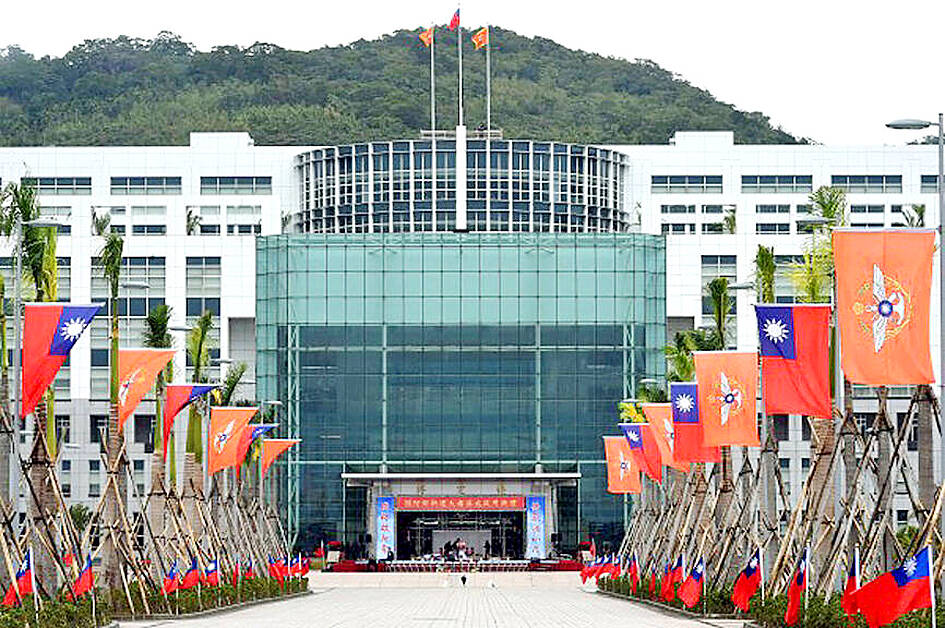The army’s brigade-level exercises later this month would adopt a nonstop 24-hour training format to test military personnel in various scenarios, including nighttime combat, the Ministry of National Defense (MND) said.
The drills would be under the command of the 6th Army Corps and would be held from Oct. 28 to Nov. 1, a report by the ministry-affiliated Youth Daily News on Saturday quoted Lieutenant General and 6th Army Corps Commander-in-Chief Li Tien-lung (李天龍) as saying.
The drills would focus on decentralized command, the forces’ capability to manage the flow of intelligence and logistics, and would be combat-oriented, the report said.

Photo courtesy of the Ministry of National Defense
During the exercises, two army brigades would simulate real combat — the Armored 586 Brigade of the 10th Army Corps, which is responsible for defense in central Taiwan, and the 8th Army Corps’ 333 Mechanized Infantry Brigade, which is based in southern Taiwan — a military source said separately on Saturday.
Li said the exercises would be a non-stop drill over the five-day period to test and train the troops in a wide range of scenarios, which would also cover nighttime combat.
The 24-hour training format was first adopted in late July during the Han Kuang military exercises, the country’s major annual military drills, but the five-day exercises were cut short due to Typhoon Gaemi.
Such exercises at the brigade level can help train combat troops, brigade commanders and chiefs of staff to improve their decisionmaking, Institute for National Defense and Security Research research fellow Su Tzu-yun (蘇紫雲) said.
The mobilization of the brigade’s battalions would train the troops in different battlefield scenarios, Su said.
He also said that reservists might be called up to join the exercises for the first time as part of their required 14-day training, given that the goal set out during the first meeting of the Whole-of-Society Defense Resilience Committee, which was convened by President William Lai (賴清德) on Sept. 26, was to enhance national defense.

WANG RELEASED: A police investigation showed that an organized crime group allegedly taught their clients how to pretend to be sick during medical exams Actor Darren Wang (王大陸) and 11 others were released on bail yesterday, after being questioned for allegedly dodging compulsory military service or forging documents to help others avoid serving. Wang, 33, was catapulted into stardom for his role in the coming-of-age film Our Times (我的少女時代). Lately, he has been focusing on developing his entertainment career in China. The New Taipei District Prosecutors’ Office last month began investigating an organized crime group that is allegedly helping men dodge compulsory military service using falsified documents. Police in New Taipei City Yonghe Precinct at the end of last month arrested the main suspect,

A cat named Mikan (蜜柑) has brought in revenue of more than NT$10 million (US$305,390) for the Kaohsiung MRT last year. Mikan, born on April 4, 2020, was a stray cat before being adopted by personnel of Kaohsiung MRT’s Ciaotou Sugar Refinery Station. Mikan was named after a Japanese term for mandarin orange due to his color and because he looks like an orange when curled up. He was named “station master” of Ciaotou Sugar Refinery Station in September 2020, and has since become famous. With Kaohsiung MRT’s branding, along with the release of a set of cultural and creative products, station master Mikan

RISING TOURISM: A survey showed that tourist visits increased by 35 percent last year, while newly created attractions contributed almost half of the growth Changhua County’s Lukang Old Street (鹿港老街) and its surrounding historical area clinched first place among Taiwan’s most successful tourist attractions last year, while no location in eastern Taiwan achieved a spot in the top 20 list, the Tourism Administration said. The listing was created by the Tourism Administration’s Forward-looking Tourism Policy Research office. Last year, the Lukang Old Street and its surrounding area had 17.3 million visitors, more than the 16 million visitors for the Wenhua Road Night Market (文化路夜市) in Chiayi City and 14.5 million visitors at Tainan’s Anping (安平) historical area, it said. The Taipei 101 skyscraper and its environs —

Taiwan on Friday said a New Zealand hamburger restaurant has apologized for a racist remark to a Taiwanese customer after reports that it had first apologized to China sparked outrage in Taiwan. An image posted on Threads by a Taiwanese who ate at Fergburger in Queenstown showed that their receipt dated Sunday last week included the words “Ching Chang,” a racial slur. The Chinese Consulate-General in Christchurch in a statement on Thursday said it had received and accepted an apology from the restaurant over the incident. The comment triggered an online furor among Taiwanese who saw it as an insult to the